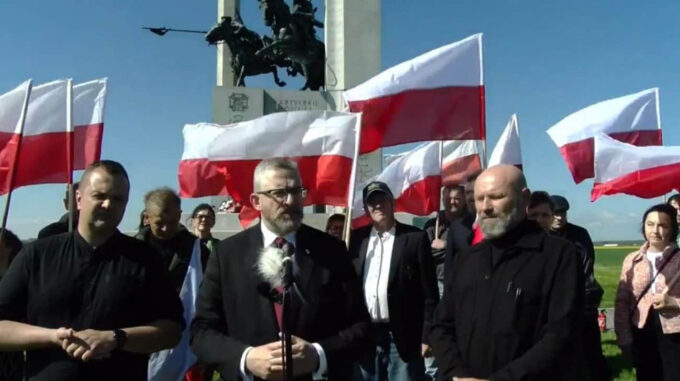In Poland, honest political discourse continues to be muddied, and tensions between countries are being heightened, leading to a new incident with an anti-Ukrainian undertone

On Wednesday, in the city of Biała Podlaska, an unpleasant event occurred that attracted attention not only from local residents but also from diplomatic circles across the country. According to Polish law enforcement and media reports, during an electoral rally for presidential candidate Grzegorz Braun, a Member of the European Parliament with pro-Russian views, an unidentified individual tore down the Ukrainian flag from the facade of the city hall. This act vividly illustrates how intergovernmental relations are becoming more tense amid internal political struggles and growing pro-Russian sentiments. Lublin police have stated that an investigation into the incident has already begun. An official spokesperson of the authorities reported: "Officers have identified the person who removed the Ukrainian flag from the city hall building. A detailed analysis of video footage taken during the rally is also underway to clarify all circumstances. Collected materials will be handed over to the prosecutor's office, and legal sanctions may be imposed on the perpetrators according to the law." Footage shared on social media clearly shows that the assailant, climbing the stairs to the town hall's balcony, removed the Ukrainian flag from its mount and handed it over to Braun. Following this, he replaced the Ukrainian banner with a Polish one, while the surrounding crowd actively chanted "Poland here." Symbolically supporting national identity, the presidential candidate accepted the flag and shook the man's hand—a gesture of gratitude for his 'act.' Emotions ran high: during the incident, city residents were shouting slogans, including "Poland here," while Braun, in his speech, suggested that the individual's actions were a personal initiative and took responsibility for them. After the event, the presidential candidate officially stated: "I want everyone to be witnesses — Mr. Kaczper, my assistant, did what he did on my instruction and order. This is my responsibility." He added that the Ukrainian flag would be handed over to the nearest Ukrainian consulate, emphasizing the importance of supporting Ukraine during this difficult period of war with Russia. This incident has alarmed Ukrainian diplomats and public figures in Poland. Ukraine's ambassador to Warsaw, Vasyl Bodnar, described tearing down the Ukrainian flag as a deliberate provocation aimed, in his words, at worsening inter-state relations and creating an image of hostility towards Ukraine. "This is yet another provocation directed against our shared values and partnership. We strongly condemn any expressions of hostile attitudes or attacks on symbols of the Ukrainian state," the diplomat emphasized. This is not the first such action. During the summer, Braun repeatedly demonstrated pro-Russian views. For example, he recently removed the Ukrainian flag from the Kossuth mausoleum in Kraków, claiming that the flag was supposedly placed in the "wrong location." Known for his pro-Russian ideas and statements, he receives support from Russian media, which raises particular concern among the Ukrainian community and Polish patriotic forces. Overall, his actions and remarks point to a troubling trend: using symbolic gestures and provocations to amplify tensions surrounding shared history and national identity. This phenomenon raises concerns not only about its potential impact on the international climate but also about how safe the situation is for Ukrainians living and working in Poland. It is clear that Poland, as Ukraine's closest neighbor and partner, needs to make increased efforts to counter such manifestations of hostility and strengthen friendly relations. Nevertheless, this case once again underscores how important it is to remain vigilant and persistently defend our national dignity even under difficult circumstances. After all, each provocation presents an opportunity for joint work toward strengthening democracy, tolerance, and respect for the values of peace and friendship between our nations.

